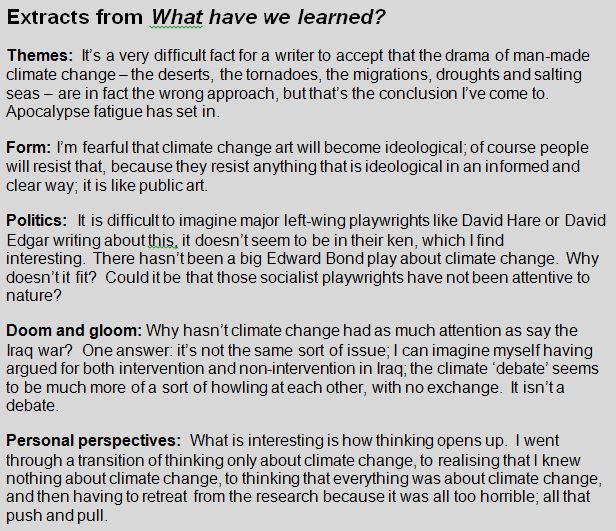Climate & Theatre
Over the years TippingPoint has commissioned many pieces of performative work relating to climate change, as the images on the home page and our commissions section illustrates, and of course there has been much more work by a variety of writers and companies, in a very wide variety of settings and styles.
What conclusions, if any, can be drawn from this experience? What have we learned? Is it possible to say what works and what doesn’t? We present here a digest of a four hour Colloquium held at the premises of Artsadmin in London on March 21 2013, with plenty of answers to these questions, but also many more questions.
We convened the event to bring together as many people as possible with direct creative experience of exploring climate change in a theatrical setting; contributors included Simon Beaufoy (The Full Monty, Slumdog Millionaire, Burn Up), Jonathan Dove (The Walk from the Garden, The Day After), Nick Payne (If There Is I Haven’t Found It Yet), Steve Waters (The Contingency Plan), Sarah Woods (My Last Car); see the appendix for full details of attendees. The aim was partly for those present to learn from each other, partly to share their hard-won experience and insight in the hope that it will help others.
Two documents are available here for download. The first is a fine review by Dr Bradon Smith of much of the work that has been presented in the UK - Staging climate change: the last ten years. We invited everyone who attended the Colloquium to read this to ensure as level a playing field as possible. Download it here.
The second is a summary of the meeting. Comments have been grouped together under headings; also, in order to ensure free exchange of views we guaranteed those present that they would have anonymity! We did not seek any sort of consensus - an unrealistic objective - but some common views certainly did emerge - and we think it will be of real value to anyone thinking about the subject. Download it here.
Both of these documents inevitably have a UK focus - though we believe they will also be relevant internationally. We’d be very interested to know if they are useful, and grateful for any other comments - with a distinct preference for constructive ones.
Comments are closed.


